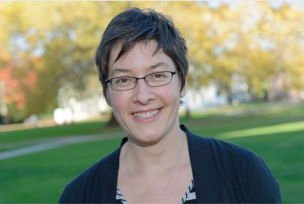
The new Queer Studies Course Cluster appears on WesMaps for the first time for the Spring 2015 semester. The cluster is designed to bring cohesiveness to the academic queer community on campus and was orchestrated primarily by Associate Professor of American Studies and Anthropology Margot Weiss, who has been hoping to assemble a formal grouping of queer studies classes since she began teaching at the University.
“I have been compiling, since I’ve been here, informal lists of courses that students who are interested in queer studies might want to take and have maintained them on a separate website…with an eye to when [we] will be able to do something with this,” Weiss said.
Queer studies has been rising in popularity at the University most notably since 2001, when students in the Queer Alliance lobbied the administration for a designated faculty hire. As a result, Weiss was granted this position, which also led to a standing concentration in queer studies within the American Studies Department. Weiss did want to have queer studies classes available outside of American Studies, but doing so required sufficient faculty.
“We need positions dedicated to the field in order to have regular classes rather than one-off, here and there, when people are visiting or whatever,” Weiss said. “It was my job to offer those courses and build that curriculum in American Studies. But we also thought it was would be great to, outside of American Studies, develop the curriculum.”
According to Weiss, the Queer Studies Course Cluster was established after the hire of Assistant Professor of American Studies Laura Grappo ’01, who specializes in queer theory.
“It can’t just be my courses, there has to be a broader set of courses,” Weiss said. “[Due to Grappo’s hire,] even if I’m away, we have people to offer the Queer Theory Colloquium…so it seemed like it was finally stable enough, we had a range of courses in different departments, that we could offer something.”
As a student at the University, Grappo participated in the campaign for a queer studies faculty member.
“When I was an undergrad at Wes, I wanted to take queer studies classes and could never get in, as the few queer studies classes that were offered were incredibly popular,” Grappo wrote in an email to The Argus. “I remember doing activist work centered on adding more queer studies classes and faculty to the University’s course offerings, so I am utterly thrilled to be back and to be personally teaching queer studies at Wesleyan.”
The Queer Studies Course Cluster is intended to give a more formal platform and community to the academic queer community at the University. It will also provide programs specific to the field.
Sophie Massey ’15 expressed hope that the course cluster might build underclassmen interest in queer studies.
“It’d be cool to get an intro, freshmen-level queer class,” Massey said. “It was something I was really craving. I’ve taken a queer class the last three or four semesters which has been really great and empowering. My queer classes do a lot for me emotionally and it would have been nice to have it earlier.”
Massey also spoke to the potential of a more accessible academic queer community.
“I’m struggling with a lot of other parts about queerness at Wesleyan,” Massey said. “I feel like the academic queerness is really vibrant here but not necessarily the other pieces of it. It would be nice to see that academic part inspire other things or help build other things.”
Virgil Taylor ’15 further emphasized the importance of queer studies in identity development.
“I’ve gained a lot from an academic perspective on my identity and that’s partly through queer studies courses,” Taylor said. “Queer studies is really great because it’s a space for examining the uncomfortable parts of life and I think that a lot of learning comes out of discomfort. The more ways that we can make critically engaged forms of discomfort available to students, the better.”
At the moment, Weiss has no plans to advance the Queer Studies Course Cluster into a certificate, program, or department.
“If we have tons of students who are interested in Queer Studies and wanted something else, there are possibilities for things we could develop in the future, but there [is] no plan right now,” Weiss said. “There are downsides to institutionalizing that way…. So much of queer studies is about undermining normative approaches to knowledge and to institutionalization itself, it would be a little ironic to institutionalize it in that way.”
Massey, who is currently teaching a student forum in Critical University Studies, echoed this sentiment.
“I think I would feel a little self-conscious if there was a Queer Department but not a Black Studies Department,” Massey said. “I don’t know what makes queer worth being invested in more than these other things…. These minority disciplines can often be incorporated into the University. Universities perpetuate inequality, and so by incorporating queer people and queer studies and people of color and critical race studies, it makes the University more inclusive but not more accessible.”
Weiss emphasized that her goal is to make queer studies more easily available to students at the University.
“I’m excited about having a non-departmental or non-program or non-disciplinary site for students and for faculty,” Weiss said. “My goal is to—because queer studies is the best—introduce students who don’t really know about it, make it more visible in the curriculum and then build student interest in the field by presenting it in a more organized way.”


Leave a Reply